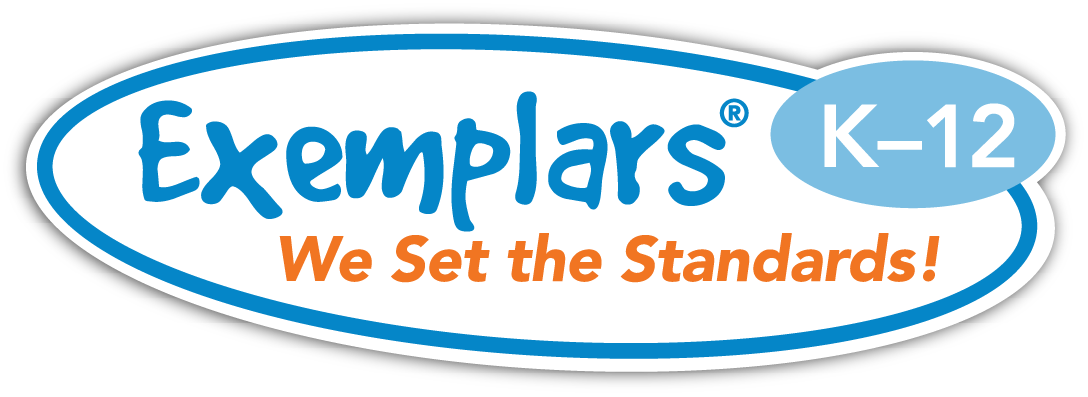Exemplars Community
 Exemplars is created by and for educators.
Exemplars is created by and for educators.
Our community is a growing body of teachers, instructional leaders, administrators, principals, and professional development consultants that encompass 50 states and 33 countries around the world.
We grow stronger as a community of learners through collaboration. In an effort to bridge our experiences, Exemplars strives to promote communication through its blogs, newsletters, and by sharing success stories and tips from other users.
Contact us at any time to share your suggestions, offer feedback, or to ask questions.
Administrators
Exemplars provides standards-based performance tasks for schools and districts in the areas of Math, Science, and Writing. All of our material has been classroom-tested and is based on sound scientific research.
Providing teachers with a firm foundation in assessment and instruction will not only enable them to help students meet state, national, and Common Core standards but also bring students to higher levels of achievement and greater understanding.
As administrators, there are a number of ways that you can help your teachers become successful Exemplars users and skilled in the art of assessing student performance:
Introduce performance-based assessment and instruction practices.
Exemplars makes it possible for schools, districts, and teachers to begin using excellent performance assessment. Our material includes subject-specific rubrics as well as task-specific rubrics aligned to standards, communication, concepts and skills. Our tasks include individual write-ups and/or Preliminary Planning Sheets and student anchor papers for assessment and instruction.
Our goal is to provide teachers and administrators with tools to successfully integrate standards-based assessment and instruction in a user-friendly way. While all of our material may be easily differentiated, our math material has been formally differentiated to further facilitate this process.
Encourage Teachers to use the "Getting Started" resources on the Exemplars Math and Science Library
To help schools use our material, we have put together suggestions from experienced Exemplars users and workshop participants. The "Getting Started" sections of the Exemplars Math and Science Library leads teachers through a step-by-step process for successfully using our material. These resources may also be used as components in your staff development.
- The Math Library provides teachers with tips for launching problem solving in their classrooms and promoting the use of formal math language and connections. It also offers a variety of classroom resources and grade-specific modeling videos.
- The Science Library offers teachers tips and suggestions for launching inquiry-based investigations in their classrooms, using our rubrics, and guiding students to design and conduct investigations. It also offers a variety of classroom resources.
Have teachers assess student work together.
The most powerful conversations teachers can have are about student work. They can begin to practice by assessing sample pieces of student work using our Formative Assessment guidelines. Additional examples may be found in Exemplars summative assessment tasks, where student work is assessed and scoring rationales are provided for teachers.
Communicate the importance of using student rubrics.
Students who are good self-assessors will perform more successfully than others. Encourage your teachers to use student rubrics in their classrooms.
Provide professional development to maximize the results of performance-based assessment.
We have found that our most successful users are in schools and districts where educational leaders have taken an active role in helping their colleagues integrate Exemplars. Areas where professional development is helpful include:
- Getting started with real problem solving and inquiry-based science
- Teaching students to communicate their thinking
- Using results to improve performance
- Managing the problem-solving/inquiry-based classroom
- Integrating content and problem solving/inquiry-based science
We have many years of experience in helping teachers achieve success in these areas. Our professional development workshops may be customized to meet the specific needs of your school and/or district.
Teachers
Exemplars publishes performance tasks in the areas of Math, Science, and Writing to help teachers use and integrate authentic, performance-based assessment and instruction into their classrooms.
Our material includes rubrics, annotated anchor papers, and teacher notes for assessment and instruction. It has been classroom tested and is based on sound scientific research.
As teachers, there are a number of things you can do to help your students become successful in problem solving, while meeting state, national, and Common Core standards.
Use Exemplars often in your classrooms.
Research shows that students who solve problems often become better problem solvers than students who do not. Exemplars has created a series of professional resources to help you get started on the right foot. In the area of math, please refer to the "Getting Started" section of our online Library for tips on engaging your students with problem solving. Our Science Toolkit offers equally helpful strategies for integrating our science material in your classroom. Real problem solving is new to many students. They will need practice to become successful. It is important to be persistent.
Practice assessing student work.
You can practice assessing sample pieces of student work using Exemplars Online Math Tutorial. Additional examples may be found in Exemplars summative assessment tasks, where student work is assessed and scoring rationales/assessment notes are provided. Practice scoring with your colleagues and discuss your results. Some of the most powerful conversations teachers can have are about student work.
Become familiar with Exemplars rubrics.
Use the rubrics along with the respective anchor papers to assess student work. You will gain important insights into your students' thinking by utilizing these tools.
Inform your instructional practices.
Assessment is more than assigning a score. It is using results to improve performance. Use the insight gained from assessment to inform your instructional practices. Examine the scoring rationales/assessment notes on the Exemplars anchor papers. These often provide instructional clues based on what students have done.
Help your students become better self-assessors.
Research shows that students who are good self-assessors perform at higher levels. Encourage your class to use the Exemplars student rubrics. Practice assessing together as a whole class. Ask your students to assess their own work before submitting it to you. Then, assess it yourself and return their papers along with your assessment.
Notify parents and guardians about Exemplars.
Customize this letter that informs parents and guardians about Exemplars and provides resources they may use to support their student.
Parents
To be successful, students must be able to apply skills and concepts to problem-solving situations and to communicate their thinking to others. In an effort to help kids achieve their fullest potential and learn critical life skills, Exemplars has developed engaging and challenging problems for Math, Science, and Writing for the purpose of instruction and assessment.
All our material is based scientific research and classroom tested (used by real teachers with real students) before it is published. Exemplars is used in 50 states and more than 30 schools worldwide.
Below are suggestions for ways you can help your children become successful problem solvers and communicators.
Encourage your kids to solve problems.
Students who do demanding work and solve real problems achieve at higher levels than students who do not. Exemplars offers sample problems at different grade levels that you can use with your children.
Help your kids become good self-assessors.
Students who are good self-assessors achieve at higher levels than those that do not self-assess. Exemplars has rubrics that kids can use to assess their own performance. There are also anchor papers that exemplify different levels of performance. Show these to your children. Ask them to evaluate these papers and then ask them how they can make each one better.
Practice scoring sample student work.
Students can also gain experience by evaluating other students' work. They can practice online with Exemplars scoring tutorial. With the tutorial, they can evaluate samples and compare their assessments to Exemplars.
Exemplars Ambassadors
Join a community of passionate fans who are looking to elevate math proficiency to the next level, and are seeking connection, inspiration, and growth through personal development opportunities and networking. Learn more about our Ambassador Program!
Collaborators
Exemplars has had the privilege of working with schools, districts and resource centers around the country. Here are some of the outstanding groups with whom it has collaborated with over the last 26 years:
- California School Leadership Academy
- CEEMaST
- Charles A. Dana Center
- Collaborative for Educational Service
- The Council for Basic Education
- The Education Trust
- The El Paso Collaborative for Academic Excellence
- First in the World Consortium
- Learn2Inquire
- The Maryland Assessment Consortium
- Mid-Continent Research for Education and Learning
- North Central Regional Educational Laboratory
- WestEd

